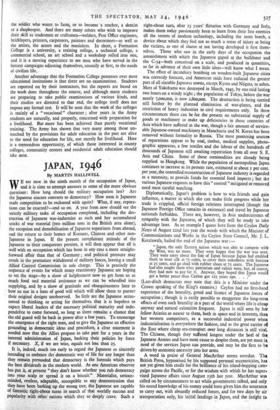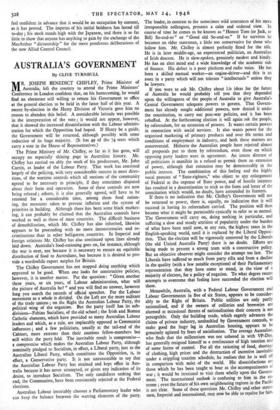JAPAN, 1946
By MARTIN HALLIWELL
WE are now in the ninth month of the occupation of Japan, and it is time to attempt answers to some of the more obvious questions: How long should the military occupation last? Are the Japanese sincere converts to democracy? How soon is Japanese trade competition to be reckoned with again? What, it any, repara- tions can be exacted?—and so on. A year from now should see the strictly military tasks of occupation completed, including the des- truction of Japanese war-industries as such and her accumulated stocks of war material (two million tons in the British area alone), the reception and demobilisation of Japanese repatriates from abroad, and the return to their homes of Koreans, Chinese and other non- Japanese in Japan. If the present complaisant attitude of the Japanese to their conquerors persists, it will then appear that all is well with an occupation which has been in any case a more straight- forward affair than that of Germany ; and political pressure may result in the premature withdrawal of military forces, leaving a small Allied Control Commission in sole charge. This is precisely the sequence of events for which many reactionary Japanese are hoping to set the stage—by a show of helplessness now to get from us as much food and material assistance as we can be wheedled into supplying, and by a show of gratitude and obsequiousness later to bow us out in a haze of good will which will allow them to pursue their original designs unobserved. So little are the Japanese accus- tomed to thinking or acting for themselves that it is hopeless to expect liberal leaders of the necessary political maturity and inde- penderce to come forward, so long as there remains a chance that the old guard will be back in power after a few years. To encourage the emergence of the right men, and to give the Japanese an effective grounding in democratic ideas and procedure, a clear statement is needed now that the Allies propose to take part for x years in the internal administration of Japan, backing their policies by force if necessary. X, if we are wise, equals not less than 25.
It is, indeed, much too early to regard the Japanese as sincerely intending to embrace the democratic way of life for any longer than they remain persuaded that democracy is the formula which pays the best dividends in the modern world. As one American observer has put it, at present "they don't know whether you rub democracy into your scalp or spread it on a biscuit." Materialist, serious- minded, restless, adaptable, susceptible to any demonstration that they have been barking up the wrong tree, the Japanese are capable of fantastic right-about turns in search of that worldly success and popularity with other nations which they so deeply crave. Such a right-about turn, after 15 years' flirtation with Germany and Italy, makes them today passionately keen to learn from their late enemies all the secrets of modem technology, including the atom bomb, a device about which they feel not so much a sense of injury at being the victims, as one of shame at not having developed it first them- selves. Those who saw in the early days of the occupation the astonishment with which the Japanese gaped at the bulldozer and the C-54—both conceived on a scale, and produced in quantities, so far in advance of their own little ideas—will know what I mean.
The effect of incendiary bombing on wooden-built Japanese cities was correctly forecast, and American raids have reduced the greater part of all sizeable Japanese towns, except Kyoto and Niigata, to ashes. Most of Yokohama was destroyed in March, 1945, by one raid lasting two hours on a windy night ; the population of Tokyo, before the war nearly 7,000,000, is now 2,800,000. The destruction is being carried still further by the planned elimination of war-plants, and the restriction of heavy industries to civil requirements only. In these circumstances there can be for the present no substantial supply of goods or machinery to make up deficiencies in those countries of Asia which have suffered in the war, though a fair amount of service- able Japanese-owned machinery in Manchuria and N. Korea has been removed without formality to Russia. The most promising sources of reparations appear to be coal, timber, medical supplies, photo- graphic apparatus, a few textiles and the labour of the hundreds of thousands of Japanese still awaiting repatriation from all over S. E. Asia and China. Some of these commodities are already being supplied to Hongkong. While the population of metropolitan Japan continues to increase at its present rate, estimated at about r per cent. per year, the controlled reconstruction of Japanese industry is regarded as a necessity, to provide funds for essential food imports ; but the various Japanese requests to have this" control "mitigated or removed need most careful watching.
Diplomatically, Japan's problem is how to win friends and gain influence, a matter in which she can make little progress while her trade is crippled, official foreign relations interrupted (though the Japanese Foreign Office remains in existence) and travel by Japanese nationals forbidden. There are, however, in Asia undercurrents of sympathy with the Japanese, of which they will be ready to take advantage later. As an example I quote here from the Ceylon Daily News of August 22nd last year the words with which the Minister of
Communications and Works in the Ceylon State Council, Mr. J. L. Kotalawala, hailed the end of the Japanese war :—
"Japan, the only Eastern nation which was able to compete with the West, was no more. They were happy that the war was over. They were sorry about the fate of Japan because Japan had enabled them to wear silk at 75 cents, to cover their nakedness with banians at 25 cents, and go shod with rubber shoes at 75 cents. The Japanese had also taught them what patriotism and valour were, but, of course, they had now to pay for it. Anyway, they hoped that Japan would get a better peace than Ceylon got 125 years ago. . . ."
(Last-ditch democrats may note that this is a Minister under the Crown speaking of the King's enemies.) Ceylon had no first-hand experience of the brutality, greed and licence of Japanese forces of occupation ; though it is easily possible to exaggerate the long-term effects of even such brutality in a part of the world where life is cheap anyway and natural calamities frequent. Japan is still seen by her fellow Asiatics as nearer to them, both in space and in interests, than her western competitors, as a successful industrial power when
industrialisation is everywhere the fashion, and as the great carrier of the East where cheap sea-transport over long distances is still vital. The Chinese, though they suffered longest under the heel of the,
Japanese Armies and have most cause to despise them, are yet most in need of the services Japan can provide, and may be the first to be driven by economic necessity into her arms.
A word in praise of General MacArthur seems overdue. The British Press, hypnotised by his supposed personal eccentricities, has not yet given him credit for the brilliance of his island-hopping cam-
paign across the Pacific, or for the wisdom with which he has super. vised Japanese affairs since August 15th last year. MacArthur was
called on by circumstances to act while governments talked, and only his sound knowledge of his enemy could have given him the assurance
to carry out, with absurdly reduced forces, and for two days by air • transportation only, his initial landings in Japan, and the insight to
feel confident in advance that it would be an occupation by consent, as it has proved. The impetus of his initial boldness has lasted till to-day ; his stock stands high with the Japanese, and there is so far little to show that anyone has anything to gain by the exchange of the MacArthur " dictatorship " for the more ponderous deliberations of the new Allied Control Council.



























 Previous page
Previous page